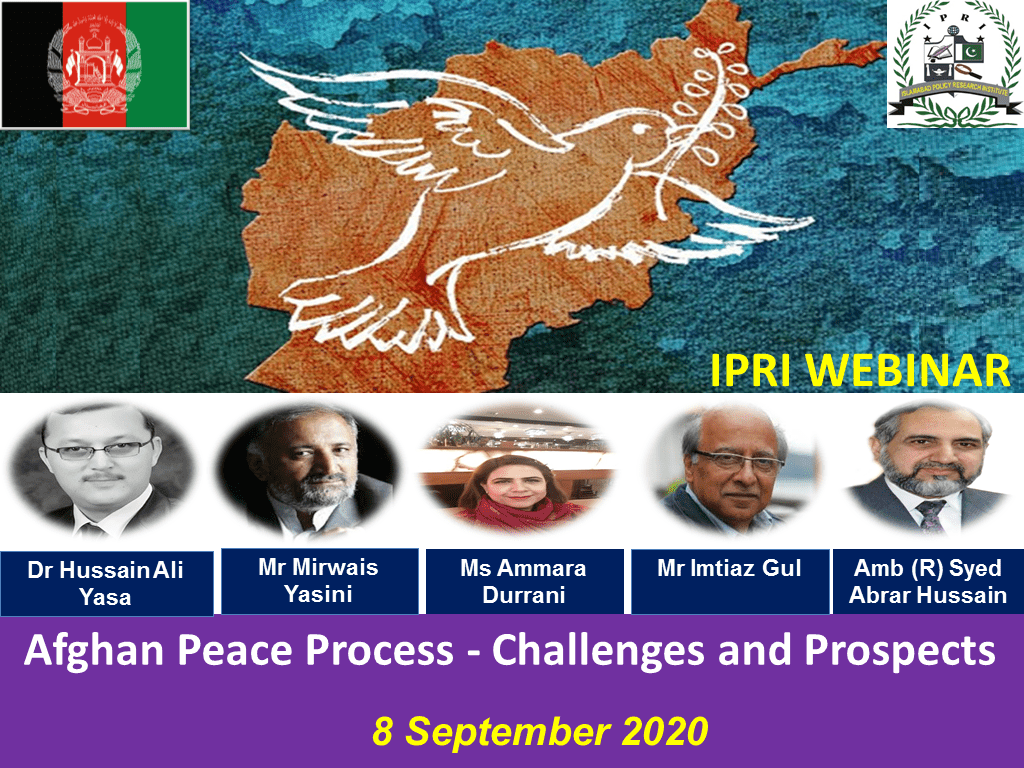Announcements 03/09/2020
Afghan Peace Process: Challenges and Prospects
Concept Note of the webinar:
The Doha Agreement between the United States and Taliban has made modest headway in meeting the terms of the Agreement. President Ashraf Ghani’s government was not party to the Agreement and was reluctant to follow its terms, especially on release of 5000 Taliban prisoners in lieu of 1000 government prisoners held by the Taliban. Although a Grand Jirga has authorized the release of the remaining 400 Taliban prisoners, there are still many glitches causing delays for the initiation of the Intra Afghan Dialogue.
The peace process would ensure and cater for a comprehensive dialogue including inter alia, the nature and structure of future government, the Afghan constitution, future of Afghan security forces through foreign assistance, repatriation of Afghan refugees and the smuggling of narcotics across its border.
Concurrent to the Afghan peace process, the role of Afghanistan’s neighbors in stabilizing the situation in the country is of utmost importance. However, such an effort on a regional scale will face significant challenges if the United States withdraws its troops from Afghanistan before a deal between the Afghan government and Taliban is signed. Moreover, the role of the United Nations has to be taken into account after the withdrawal of American troops from Afghanistan.
In his meeting with the Taliban delegation, Pakistan’s Foreign Minister Shah Mehmood Qureshi emphasized Pakistan’s commitment to the return of refugees to their homeland with ‘dignity’. However, the flow of refugees back to Afghanistan will depend on the social and economic realities in the country. It is upon the normalcy of political activity, an end to violence and a guarantee to their life and safety that refugees will be able to settle back.
To deliberate on the aforementioned aspects of the Afghan Peace Process, the Islamabad Policy Research Institute (IPRI) is organizing a Webinar titled, “Afghanistan Peace Process: Challenges and Prospects”, on September 8, 2020. A panel of prominent researchers, academics and diplomats will participate in the webinar to enrich the discussion.
Themes of the webinar:
1. Dr. Hussain Ali Yasa (Writer and Political Analyst, Afghanistan)
Future Contours of Afghan Polity: Is a Rapprochement Possible in Afghanistan?
2. Mr. Mirwais Yasini (Member Afghan Parliament)
Does the Existing Afghan Constitution Cater Afghanistan’s Political Needs?
3. Mr. Imtiaz Gul (Executive Director of Center for Research and Security Studies)
Role of Neighbours in the Stability of Afghanistan
4. Ambassador (R) Syed Abrar Hussain (Former Ambassador to Afghanistan)
Can UN Contribute towards Afghanistan’s Reconstruction in the Post US Withdrawal from Afghanistan?
5. Ms. Ammara Durrani (Senior Research Fellow, Jinnah Institute)
International Efforts for the Repatriation of Afghan Refugees

